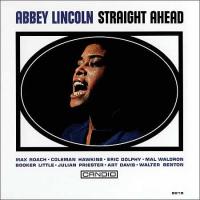Dream Band Backs Up Lincoln on This Pure Pleasure Candid Reissue
Abbey Lincoln:
In the upside down year of 1961 (not until 6009 will that happen again), the Kennedy era began, Washington D.C. residents finally got the right to vote in presidential elections thanks to the 23rd amendment to the constitution, and the civil rights movement was in its most activist period, with sit-ins staged throughout the south at public places and freedom riders traveling on buses to force the de-segregation of bus terminals as mandated by federal law.
The response to the confrontational activism was violence (today we call it “terrorism”), by threatened whites in the form of firebombings, vicious mob attacks, mass beatings and arrests followed by abusive treatment in jail (today some call it “torture,” others “fighting the war on terrorism”) or just plain murder-sometimes committed by or with the approval of those charged with upholding the law.
It was an ugly time, a time when raw hate bubbled to the surface across the south. Yet it was also a time of great moral righteousness and dignity as the black leadership at the time preached non-violent means to effect change and these techniques, combined with increasing television coverage awoke the national consciousness.
This record is a product of those times. On it, Abbey Lincoln expresses the anger, resignation, bitterness and alienation, as well as the strength and pride felt by Negroes at that time (this was before Black became acceptable), as they demanded, fought for, and began receiving the freedom and equality before the law promised by the Constitution.
Lincoln was well on her way to becoming a groomed and packaged nightclub singer (“a sexy supper-club chanteuse” is how Nat Hentoff's annotation puts it), until drumming great Max Roach got a hold of her.
On this brooding, introspective set, Roach is joined by Eric Dolphy, Coleman Hawkins, Booker Little, Mal Waldron and Julian Priestly. Not a bad back up band! The mood is akin to Billie Holiday's foreboding “Strange Fruit,” though not as bitter, with Holiday's influence also heard and felt in Lincoln's vocal timbre-particularly in the lower registers.
The opening title tune, written by long-time Holiday accompanist Mal Waldron, with lyrics by Lincoln and Earl Baker sets the serious mood, with a deliberately paced, spare melody and lyrics that use roads and traveling to express the long, hard push toward racial equality in America.
“When Malindy Sings,” based on a remarkably contemporary sounding poem by 19th century Black poet Paul Laurence Dunbar with music by Oscar Brown, sounds as if it alone (the poem) could have inspired The Gershwins to write “Porgy and Bess.”
“In the Red” is, as the title suggests, a bitter, parched, oppressive 8 minute plus piece about poverty and indebtedness, with Lincoln dropping her vibrato for an almost blood curdling, “shouty” tonality that suggests anger but never comes right out with it. This was 1961 after all. It would take a few more years before the real anger surfaced.
Side two features a Waldron arrangement of the familiar “Blue Monk,” with lyrics by Lincoln describing the difficult process of self-discovery and expression-something she does throughout this set.
Mal Waldron's “Left Alone,” with bitter lyrics by Billie Holiday gets an appropriately spare and effective arrangement by trombonist Priester, with Lincoln backed mostly by drums, bass and piano , though there's a memorable sax solo (one of many on this record) by Coleman Hawkins. It's the album's most affecting tune.
“African Lady,” based on a then-new Langston Hughes poem, a melody by Randy Weston and an Afro-Cuban tinged Waldron arrangement featuring Dolphy's bird-like flute lines provides a welcome, optimistic break from the album's generally downcast subject matter.
The set concludes with “Retribution,” featuring Lincoln's sly lyrics about giving and getting in personal relationships (“let the retribution match the contribution,” she suggests).
Musically, Straight Ahead reflects the seriousness of the time in which it was created. The album's intimate sonics also reflect the time in which it was recorded. Instrumental timbres are stunningly natural and notably delicate and transparent, with the musicians spread across the stage in a tight arc. Lincoln's voice is in the room, free of noticeable studio processing. Only on the fades can you hear the remnants of the subtle reverb added to her voice to give it a bit of body and context.
Musically and sonically, this is another superb reissue choice by Pure Pleasure. Highly recommended-just don't expect to get a “Jersey bounce” out of it!
Another Lincoln reissue, Abbey Is Blue came my way recently via Joerg Kessler's Hamburg Germany based ars! music (www.ars-music.de). It's a 180g reissue of a 1959 Riverside release (RLP1153), featuring an eclectic set of “blue” tunes including Ellington's “Come Sunday,” “Laugh, Clown, Laugh,” “Softly As in a Morning Sunrise,” and even Weill's “Lost in the Stars.”
Lincoln is backed by another great grouping, including Kenny Dorham, Max Roach, Stanley and Tommy Turrentine and trombonist Priester. On this set Lincoln is equally effective but somewhat less daring, and the engineer has chosen to drown her in reverb, while leaving the rest of the musicians in a dry climate. The result is Lincoln sounds as if she's singing from another time zone. If Straight Ahead makes you an Abbey Lincoln fan, you should consider Abbey Is Blue, but if you're choosing one, go for Straight Ahead
.


